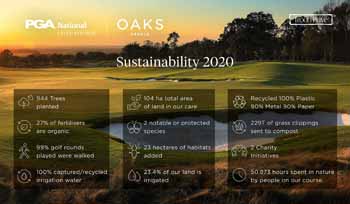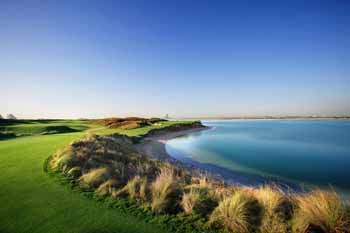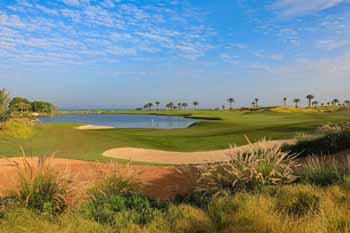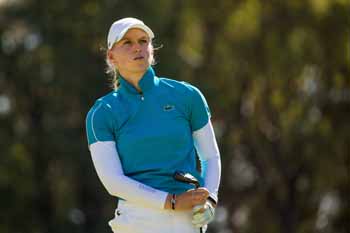‘This safeguards the club’s future’
A golf club in Singapore aims to be carbon neutral by next year, a facility in the Czech Republic is ensuring the majority of its land is natural habitat, two clubs in the UAE have eliminated single-use plastic bottles from their premises and a venue in Barbados is building a solar farm.
Golf clubs all over the world are increasingly using their environmental credentials as marketing hooks.
Sentosa Golf Club in Singapore, for example, has said it will become the world’s first ever carbon neutral golf club next year.
Contributions from golf rounds over the next 12 months will be set aside to support the purchase of certified carbon offsets through regional projects that will sequester atmospheric carbon while defending against deforestation and fostering conservation of forests, mangroves and reefs.

The club recently enhanced the energy efficiency of its clubhouse, introduced lithium battery golf carts and increased the efficiency of its irrigation system by deploying some 1,200 water saving sprinklers across the golf courses, and is installing two food and horticultural waste digesters to limit carbon emissions by grinding down waste on-site and reusing it as fertiliser on its two championship courses.
It will also step up its efforts to pursue solutions that will make club operations and grounds maintenance more carbon efficient, including golf equipment and maintenance fleet electrification initiatives and renewable energy sources.
![]()
Andrew Johnston, general manager and director of agronomy, said: “We are excited to set the aspiration to become the first golf club in the world to go carbon neutral. Since joining the United Nation’s Sports for Climate Action initiative in 2020 it has been our goal to become carbon neutral and hopefully inspire others around the world to follow suit.
“The club is also proud to be aligned with Sentosa Island’s recent commitment to become a carbon neutral destination by 2030. Our vision is to deliver a world-class facility of exceptional quality, and our commitment to carbon neutrality will safeguard the club’s long-term future and allow us to be a model for sustainability in golf worldwide.”
PGA National Czech Republic at Oaks Prague is also showing off its sustainability credentials.

Having opened just a few months ago, the PGA National Czech Republic has added 23.15 hectares of natural habitat in the last year to have 76 percent of its land as undisturbed to promote biodiversity.
This results in a reduction in the use of fertilisers, chemicals and irrigation due to a reduced turf area. With the turfgrass there is, it is a priority to manage grasses that are best adapted to the local climate and soils, in turn, reducing artificial substances needed to ensure the grass is strong and healthy. Naturalising out-of-play areas on the course has also helped to reduce energy consumption through less irrigation pumping and machinery fuel costs.
A goal at the club is to avoid sending waste to landfill, which means finding ways to reduce, reuse and recycle all materials. Through avoiding single-use plastic products such as bottled water, straws and cups, the venue is successfully recycling 100 percent of plastic, 90 percent of metal, 90 percent of paper / cardboard and 100 percent of grass clippings, which are sent to compost. There is also a commitment to 100 percent of irrigation water being captured from the on-course drainage system filtering rainwater.
Jordan Fairweather, golf course superintendent and head of estate management at PGA National Czech Republic, said: “We hold ourselves to the highest standards at the PGA National Czech Republic, recognising our responsibility in implementing sustainability practices for the local community, the longevity of the golf industry and all stakeholders.”
Saadiyat Beach Golf Club and Yas Links Abu Dhabi in the United Arab Emirates have both eliminated all single-use plastic bottles from their premises as of this year.

A combined total of over 100,000 plastic water bottles are consumed by golfers between the two properties on an annual basis. Members and guests are encouraged to use and refill their own reusable water bottles from the water coolers throughout their round, these water coolers are equipped with hand sanitisers following health and safety directives as well as ensuring a hygienic environment for players and associates alike.
Francisco de Lancastre David, cluster general manager at Saadiyat Beach Golf Club and Yas Links Abu Dhabi, commented: “As plastic waste and pollution increases, we should all be making a conscious effort to do our part. I’m proud to have both golf clubs onboard with this new sustainable initiative, which will reduce our carbon footprint significantly and I hope that our members and visitors will be encouraged by this when visiting the course.”

Apes Hill Golf and Beach Club in St James, Barbados, is undergoing a major renovation with sustainability at the top of the agenda. With its ground-breaking sustainable initiatives, Apes Hill is working to become the most environmentally responsible golf course in the Caribbean – from the preservation of wildlife to operating in a power neutral way.
Renowned golf course architect Ron Kirby, one of the most experienced architects in the world, has been engaged to plan and renovate the new sustainable golf course which has been underway since the end of 2019 and is scheduled to open in November 2022.
The venue is committed to becoming power neutral within three years of opening by building a solar energy farm. In addition, irrigation considerations have taken centre stage with the redesign, which has helped contribute to the development becoming Audubon certified.
An expert agronomist selected Zoyza Zorro grass for the course, which requires less water, reducing the number of sprinkler heads from 1,800 to 800. Out of play areas will have organic mulch and feather grass, which also requires less watering and fertiliser.
An artificial lake is being installed to collect rainwater for future irrigation and the latest technology is being used on the irrigation system to minimise watering with weather forecasting and remotely controlled watering.
Spread across a 470-acre site in St James, biodiversity has been another key focus in the redesign of Apes Hill, avoiding disruption of local habitats and trees, and creating new habitats through clever landscaping to enhance the development’s natural state.
Twelve acres of ‘out of play’ pockets around the golf course have been set aside for growing indigenous fruits and vegetables including pineapple, mangos, coffee, aloe and sweet potatoes. In total, Apes Hill will be creating 50 acres of farmland for hosting livestock and growing fresh produce on the east coast side of the golf course bordering holes 12, 13 and 14. In addition, beehives will be established in the gullies and habitats created to promote butterfly breading in ponds around the course.
Ron Kirby said: “We were very careful with the design to focus on reducing the footprint of the grasses that need full maintenance, water and fertilisers. Using the latest technology for irrigation, we have been able to reduce the number of sprinkler heads on the course by 56 percent. In addition, the new Zoysia Zorro grass we planted needs less water. We have reduced the number of bunkers from 107 to 38. All these factors combined have helped us to significantly reduce the overall volume of water and chemicals that are required in the maintenance of the course.”
Camille Chevalier becomes champion of sustainable golf

Ladies European Tour golfer Camille Chevalier has become a ‘Sustainable Golf Champion’ – partnering with the non-profit GEO Foundation to help support the group’s mission to advance sustainability in and through golf.
As part of this network, Camille will work closely with GEO Foundation to promote and celebrate the positive impacts golf has on nature and people, as well as encouraging further action on key issues such as pollution prevention; resource efficiency and climate change.
In addition, all activities will be closely aligned to The Ladies European Tour sustainability initiative – “Celebrating the Green, presented by Dow”, which was launched last year and aims to showcase environmental, climate and community action across women’s golf and celebrate sustainable activities stemming from players, tournaments, venues and partners.
“I have always had a special relationship with nature and the outdoors – one of the main reasons I have loved golf is because it takes place in beautiful environments,” said Camille, who won the Hero Women’s Indian Open in her first season on the Ladies European Tour. “My interest naturally evolved towards the preservation and protection of nature as I grew up during a period of increasing awareness of the impacts of climate change, plastic pollution, biodiversity loss and the need to live more sustainably.
“As a golfer, I used to practice a lot at Le Golf National and became particularly interested in the course preparation and maintenance, learning a lot about turf and agronomy from passionate people. Now on Tour I am always looking at the different ways of managing the course environment.
“Golf courses can play a key role in creation and preservation of local ecosystems. Biodiversity is very rich throughout a golf course environment and can flourish in areas subjected to very little or no maintenance. This way, local species can develop and blossom naturally.
“And it is important golfers look around them when they play. They can marvel at landscapes and wildlife that can be found on the course – to be amazed is already a first form of action to protect the ecosystem. By keeping this close contact with nature we become aware of its need for protection.
“I am excited about working with the GEO Foundation, exploring how I can live, work and play more sustainably and help celebrate all the good things that are happening in golf for nature and people.”















Let me tell You a sad story ! There are no comments yet, but You can be first one to comment this article.
Write a comment